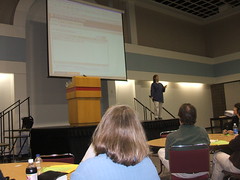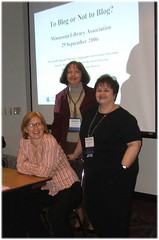I’m live blogging Jenny Levine’s session at the Minnesota Library Association annual conference in St. Cloud. Looks like Jenny blogged the previous session at Shifted Librarian.
(Jenny says she’ll be posting her presentation on her site)

She went over “what is a blog?” Different blog software. Felt sorry for anyone doing web pages with coded HTML (oops that’s us, but we’re re-designing)
Started out with the Ann Arbor site, discussing what it means to open yourself up to discussion with the community. 1,000s of comments. Pointed out that they’ve had 461 comments from teens; asked how many libraries got that many comments from teens. Teens talking about gaming, but also other things. New Book Blog. Libraries don’t have time to update websites, but can have vibrant websites if they let communities contribute. Ann Arbor has IT staff of 10. But this can be done easily.
Showed small public library blog. College of DuPage blog. Western Springs Local History Page, turned history project into a blog. Posted pictures. Comments allow community to contribute to local history.
Wiki of Directors’ Blogs – add yourself.
Photo Blog – picture is worth 1,000 words. Construction project. Display case at Western Springs. Colorado College – picture of signs. Library photo of little girl reading do you want to be the city council who cuts funding to this library?”)
Question about permissions – libraries have gotten varying opinions. Some take pictures of backs of heads. Some say it’s a public place.
RSS – lets you keep track of multiple sites.
Recommends bloglines.com
Showed ProQuest. They’ve been promising for a year that there will be an RSS feed for specified searches. Can be displayed on a webpage. Jenny says homework is to contact ProQuest and tell them to implement it.
Demonstrated RSS in EbscoHost. “Ridiculous” how difficult. Homework – talk to vendor to simplify.
Reason she talks about RSS and Bloglines. . . when you start blogging, you’ll be more efficient. Automatically generates RSS, and you can use it to create community all over the place.
A few years ago, in order to create community you needed a server.
Book, “Small Pieces, Loosely Joined”
Riverdale IL (very poor), created community blog – free. Gave accounts to everyone in town.
Superglu – (example of library use) syndicates book marks from Delicious (which has RSS feeds). includes Flickr., web site, community calendar. Topics.net. Local newspaper. Pick template and instant community website.
Patrons would like libraries publish, so that they can use it.
Ever seen a library that publishes something like an Amazon wishlist?
Live Journal – someone marked library as a “Friend”, new books list.
Instant Messaging Reference
People can add library as a Buddy, part of Instant Messaging community.
More community – difference in using indicator “I’m online”
Meebo me
6 things you can do right now
Read blogs
Start what’s new blog for your library
Appoint Trend reporter
Train staff how to use RSS aggregators (about being efficient), use bloglines
Advocate for RSS in your products (been after III for 4 years to incorporate RSS)
Learn about Library 2.0 (understand what is going on)



